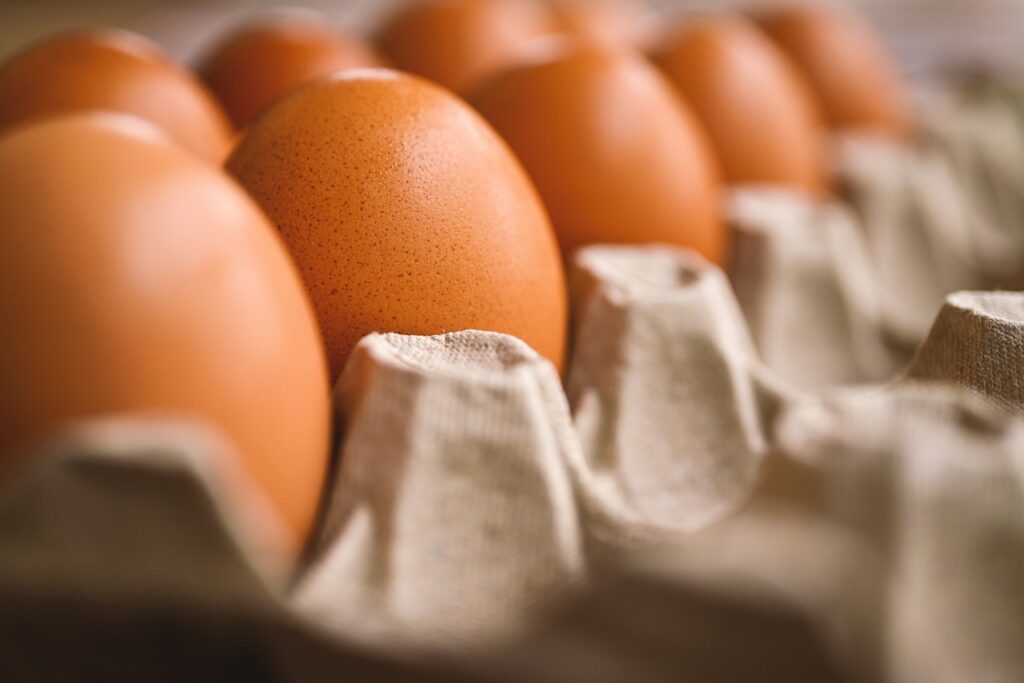Egg prices are getting out of hand lately—thanks, bird flu and supply chain mess. If you’re tired of overpaying or just want to ditch eggs altogether, here’s a guide to help you find free or cheap eggs and a bunch of solid substitutes that actually work.
🥚 10 Ways to Get Eggs for Free or Cheap
1. Raise Your Own Chickens
If you’ve got a little backyard space, a few hens can keep you stocked with fresh eggs. Most lay around 4–6 eggs a week each, so even 2–3 hens can keep your fridge full.
Startup Stuff: You’ll need a coop (build or buy), feeders, bedding, and waterers. You can DIY a lot of this with scrap materials.
Ongoing Costs: Around $15–$25/month for feed—but chickens love kitchen scraps too, which helps cut costs.
Heads Up: Check local rules. Some places allow hens but not roosters, or limit how many you can keep.
Pro Tip: Hit up local 4-H or FFA programs. These youth ag groups sometimes have extra eggs from school projects—especially after fairs or holidays.
2. Trade with Neighbors
Know someone with backyard chickens? Offer to trade!
Ideas to swap for eggs:
-
Home-baked goodies
-
Garden veggies
-
Pet-sitting
-
Food scraps (chickens love ‘em)
Check Facebook Marketplace, Buy Nothing groups, or Nextdoor. Even just posting “Happy to trade for eggs!” can open doors.
3. Visit Food Pantries or Churches
If money’s tight, don’t hesitate to check out food banks, community centers, or local churches.
Some places give out fresh groceries on “perishable days” or host breakfast events with take-home bags.
Pro Tip: Bring back empty egg cartons to farmers or backyard sellers—many offer discounts or bonus eggs for returns.
4. Join a CSA or Co-op
Community farm shares (CSAs) often include eggs or offer discounted add-ons.
Some also accept SNAP or offer work-trade deals (volunteer for a grocery discount). Food co-ops might have member perks, bulk buys, or cheaper prices than chain stores.
5. Use Cashback & Coupon Apps
Apps like Ibotta, Fetch, and Checkout 51 sometimes offer rebates—or even free eggs during holidays.
How it works: Activate the offer, shop, scan your receipt = instant savings.
Pro Tip: Look for “any brand” offers, stack with store sales, and you might get eggs for pennies (or free).
6. Shop Discount Grocery Stores
Aldi, Lidl, Grocery Outlet, Save-A-Lot, and warehouse clubs like Costco often have cheaper eggs than regular supermarkets.
Look for:
-
Clearance eggs close to “sell by” dates (still good for weeks)
-
Manager’s specials
-
Random off-brand cartons in the back of the fridge section
Pro Tip: Don’t sleep on the weirder fridges—those are gold mines.
7. Farmers Market Late-Day Deals
Visit markets close to closing time—vendors often drop prices to avoid hauling stuff back home.
Ask nicely: “Any end-of-day deals on eggs?”
Bonus Tip: Some sellers will toss in a free egg or two if you’re friendly or a regular.
Also, stores may discount cracked cartons if you ask the dairy manager. Salvage the good eggs and ditch the rest.
8. Use SNAP or WIC
If you qualify, both programs cover eggs.
Some farmers markets even double your SNAP dollars with matching programs. WIC often includes eggs in their packages, especially for kids and breastfeeding moms.
Pro Tip: Eggs on sale? Stock up and freeze them. Crack, beat lightly, and freeze in cubes or containers for later.
9. Watch for Holiday Sales
Eggs are super cheap around holidays like:
-
Easter
-
Thanksgiving
-
Christmas/New Year’s
Keep an eye on store flyers or sign up for email alerts. Stock up when the price drops.
10. Just Ask Around
You’d be surprised how often someone you know has extra eggs. Ask coworkers, friends, or post in local groups:
“Anyone have backyard chickens and extra eggs? Happy to trade!”
Sometimes all it takes is asking.
🍳 10 Egg Substitutes That Actually Work
Out of eggs, allergic, or just avoiding them? These swaps are the real deal—just pick the right one for your recipe.
1. Applesauce
-
Best For: Muffins, cakes, brownies
-
How Much: ¼ cup = 1 egg
-
Notes: Adds moisture and sweetness, not great for savory stuff.
2. Flaxseed Meal
-
Best For: Pancakes, cookies, veggie burgers
-
How Much: 1 tbsp ground flax + 3 tbsp water = 1 egg
-
Tip: Let it sit for 5–10 minutes to get that eggy texture.
3. Chia Seeds
-
Best For: Muffins, pancakes
-
How Much: 1 tbsp chia + 3 tbsp water = 1 egg
-
Bonus: Adds fiber and omega-3s
4. Mashed Banana
-
Best For: Banana bread, pancakes, cookies
-
How Much: ¼ cup = 1 egg
-
Flavor: Adds sweetness and banana flavor. Works great in sweet stuff.
Reader Hack: Tina says she now always uses an extra banana instead of eggs in banana bread. More flavor, more moisture, no eggs needed.
5. Silken Tofu
-
Best For: Custards, creamy pies, quiches
-
How Much: ¼ cup blended tofu = 1 egg
-
Flavor: Mild, super smooth
6. Yogurt (or Non-Dairy Yogurt)
-
Best For: Muffins, quick breads, cakes
-
How Much: ¼ cup = 1 egg
-
Tip: Use plain; Greek adds richness.
7. Egg Replacers (Store-Bought)
Brands like JUST Egg, Bob’s Red Mill, or Ener-G work great in baking and more.
Reader Story: Maria didn’t believe the boxed stuff worked—until she made vegan cookies that turned out perfect. Now she’s a convert.
8. Aquafaba
-
What It Is: Liquid from canned chickpeas
-
Best For: Meringues, mousse, whipped stuff
-
How Much: 3 tbsp = 1 egg
It actually whips like egg whites. No joke.
9. Nut Butter
-
Best For: Brownies, cookies, denser bakes
-
How Much: 3 tbsp = 1 egg
-
Note: Works best when a nutty flavor fits the recipe
10. Carbonated Water
-
Best For: Light, fluffy bakes like waffles or cake
-
How Much: ¼ cup = 1 egg
Adds airiness and lift—no egg needed.

